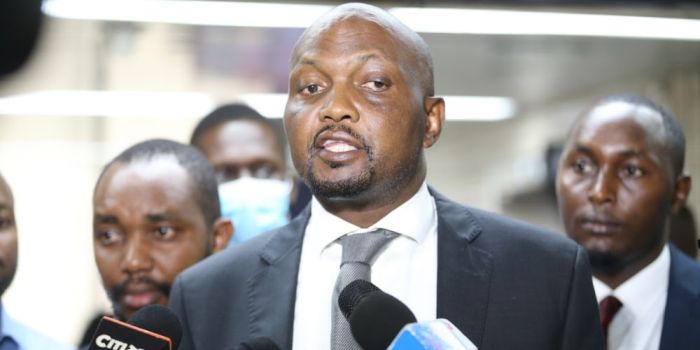Trade Cabinet Secretary Moses Kuria, on Sunday, June 18, threatened to cut government advertising and publicity on Nation Media Group (NMG) for its persistent criticism through investigative journalism.
Speaking during the Akorino Annual Convention held in Embu County, the CS publicly attacked the media house, asking it to declare whether it was playing a watchdog role or was part of the opposition.
He further warned the management of government agencies advertising with NMG to halt their spending lest they lose their jobs. Kuria pledged to enforce a clampdown on the media starting Sunday, June 18.
According to Kuria, it was no longer tenable for the Kenya Kwanza administration to continue advertising through the firm.
“You need to decide if you are a newspaper, broadcasting house, a media station or an opposition party,” he intimidated Nation Media Group, which runs NTV, Daily Nation, Nation Africa, and Nation FM, among other stations.
“I have stated that starting tomorrow if I see any government agency placing adverts in Nation Media, the person responsible will be fired,” he added.
In a follow-up statement, Kuria trolled NMG that it would only advertise auctions and obituaries.
Nation Media Group, prior to Kuria's confrontation, aired an exposé where it alleged that the ministries of Trade and Agriculture, under CS Mithika Linturi, misappropriated over Ksh6 billion in an oil scandal.
The Media Owners Association, the Editors Guild and the Media Council of Kenya (MCK) have yet to respond to Kuria's attack on Nation Media House.
Earlier on, the leader of the majority in the Senate, Aaron Cheruiyot, also accused Nation Media Group of biased coverage in a scandal involving Gatanga MP Edward Muriu and Labour CS Florence Bore.
Bore and Muriu were accused of tussling for the Ksh90-120 million house in Karen, Nairobi. Cheruiyot argued that the media ran the story without seeking Bore's rebuttal.
After the Labour CS issued her statement to clarify the alleged scandal, Cheruiyot pressured the media to give it intensive coverage too.
“I hope it will be given the same prominence that was given to the MP," Cheruiyot complained.
On May 21, 2023, Deputy President Rigathi Gachagua accused the mainstream media of incessantly criticising the government while turning a blind eye to its achievements.
“Do not give a one-sided story. When you give a story of broken promises, give the story of the kept promises and leave the people of Kenya to make a decision on whether in seven months substantial progress has been made,” he stated.
The DP, in January 2023, also claimed that the media often misinterprets his remarks to suit a certain narrative.
Nation Media Group launched its digital brand Nation. Africa in 2020 to adapt to rapidly changing consumer habits and shift overdependence on government advertising which dropped after the pandemic.
It also launched a paywall, which was later pulled down, as it looked to increase reader revenue while reducing reliance on advertising.
In 2021, print accounted for 72 per cent of the Group’s revenue. However, the media house also recorded a 20 per cent increase in digital revenue that year, a few months after launching its revamped digital website.
2 years later, in 2023, it made further changes in its editorial leadership as part of its ongoing Newsroom Integration Project. NMG converged its print and online platforms to be fully operational under one structure.
"We will therefore have the two structures operating hand in hand in a mutually reinforcing fashion until the transition is done.
"This is an important exercise that touches on how we are organised, how we do our work and what direction our journalism, in general, will take going forward. As such we have to handle it carefully and with due regard to the important role that each of us plays in our respective newsrooms every day. This explains why the new structure has to be put in place in phases," Group Editorial Director Joe Ageyo stated. By Kioko Nyamasyo, Kenyans.co.ke






